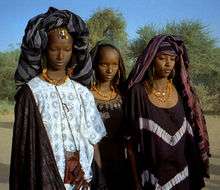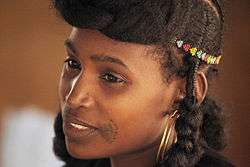Women in Niger
Women in Niger are women that are from or live in the West African country of Niger. These women belong to a population in which 98% are practitioners of Islam. Most of the laws adopted by the government of Niger to protect the rights of Nigerien women are most of the time based on Muslim beliefs.
 Three young Wodaabe women in Niger photographed in 1997. | |
| Gender Inequality Index[1] | |
|---|---|
| Value | 0.709 (2013) |
| Rank | 151st out of 152 |
| Maternal mortality (per 100,000) | 590 (2010) |
| Women in parliament | 15% (2017)[2] |
| Females over 25 with secondary education | 2.5% (2012) |
| Women in labour force | 69% (2017)[3] |

Nigerien women, not to be confused with Nigerian, consist of a variety of ethnic groups. Among the largest ethnic groups are the Hausa women, the Fulani women, the Zarma–Songhai women, and the Tuareg women. Hausa women of Niger can be identified by their dressing codes in which they wear wrappers called abaya made with colorful cloth with a matching blouse, head tie and shawl.
Traditional practices are still widely in play in Niger. Family life for young women can be a definite challenge in the primarily Islamic nation. Some of these practices have detrimental effects on the country's well being, such as the continuation of poverty and illiteracy.
A public holiday in Niger known as the National Day of Nigerien Women (Journée nationale de la femme nigérienne) held annually on the 13th of May, commemorates a 1992 march by women in Niamey during the National Conference period, demanding greater involvement of women in national institutions. It is a holiday that became a "National Commemoration" on 25 November 1992.
Cultural background
Niger is a country in West Africa. It became independent from France in 1960, and was ruled by a single-party and military rule until 1991. Most of the country has a hot, dry, desert climate. It has almost 20 million inhabitants. The ethnic groups are: Hausa 53.1%, Zarma/Songhai 21.2%, Tuareg 11%, Fulani (Peul) 6.5%, Kanuri 5.9%, Gurma 0.8%, Arab 0.4%, Tubu 0.4%, other/unavailable 0.9%. It is mostly a rural society, and almost all the population practices Islam.[4]
Fertility and family life

Motherhood in Niger has many complications. Due to economic factors, healthcare inadequacy, and traditional practices, women are at a crucial disadvantage by the time they have their first child.
Child marriage is a common practice in Niger. Around 75% of Nigerien girls are married by their 18th birthday. Although sometimes with the complicity of their family, young girls are often sold into child marriages or sex work. The practice of wahaya allows for slave traders to exploit girl as young as 9, selling them either as domestic servants or commercial sex workers. Niger is a common place for human trafficking to take place, as it is a source, point of transit, and a final destination for victims of trafficking both within and outside the country's borders. Young women, sold into their unions, are then at the will of the master in the traditional master-slave cycle that wahaya fuels.
The highest TFR (almost 7 children/woman) in the world coupled with an extremely high adolescent birth rate suggests that the young women in Niger have children at an unprecedented rate. A high rate of child marriage would, naturally, lead to very young mothers and a high fertility rate, as aforementioned. The national median age at first child for women in Niger is 18.1 years old, falling second only to neighboring Chad.
With child marriage, high adolescent birth rates, and an even greater TFR comes maternal mortality. With a maternal mortality ratio of 555 per 100,000 births, Nigerien mothers must overcome preexisting complications to ensure both lives come out successfully. A lack of quality medical care, adequate health care professionals, and economic well being all contribute to Niger's very high maternal mortality ratio. It also doesn't help when mothers are giving birth at young ages either.
Women's rights
Niger's literacy rate is one of the lowest in the world. The national average is 19.1% with women's literacy at 11%, the lowest in the world.. This data is for those 15 years and over that can read and write. Education, although accessible, is not common for young women. Less than a quarter of females, all ages, were enrolled in the education system. A strong agrarian culture, such as that in Niger, doesn't always foster the most emphasis on formal education.
Gender based violence is also omnipresent in Niger. There is very little judicial assistance when it comes to the prosecution of the abusers. It has been reported that some women in Niger find it normal to be victims of domestic violence. Traditional practices often prevail as society has deemed women inferior and therefore customary to leave the abused without justice. Violence against Nigerien women has been legitimized by generations of this culture and hardly any legal regulations to change its course. Provisions have been taken to reduce the prevalence of violence, but they have fallen short of causing a noticeable change.
References
- "Table 4: Gender Inequality Index". United Nations Development Programme. Retrieved 7 November 2014.
- "Proportion of seats held by women in national parliaments (%) | Data".
- https://data.worldbank.org/indicator/SL.TLF.ACTI.FE.ZS
- "Africa :: Niger — the World Factbook - Central Intelligence Agency".
External links
| Wikimedia Commons has media related to Women of Niger. |
